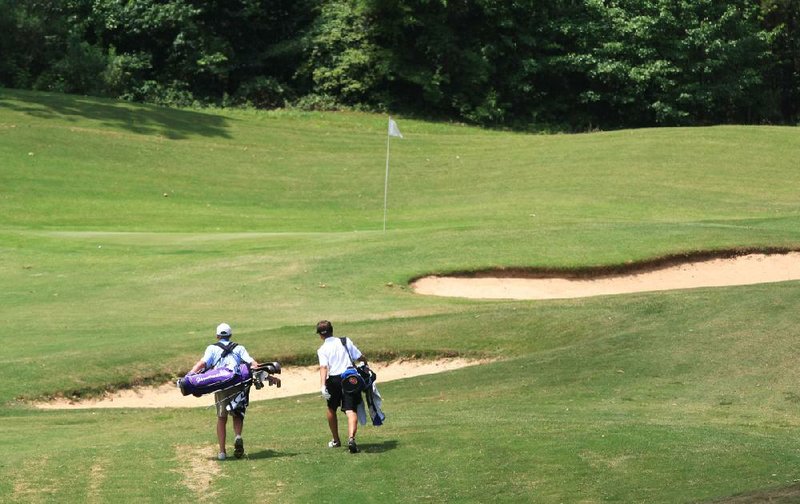LITTLE ROCK — After bad experiences the past two summers, The First Tee of Central Arkansas is taking a mulligan.
Both courses at the facility in Little Rock will be closed starting May 28 so new greens can be installed.
The 776-yard par-27 Honors course and the 3,428-yard par-36 Chairman’s course have bentgrass greens. The new greens will be champion bermuda, a more hardy grass than bentgrass, which is more prone to disease and often dies in hotter temperatures. The courses have temporarily closed the past two years because of unplayable greens.
“We’re doing something to make sure that never happens again,” Executive Director Cory Biggs said. “Not having to close in the heart of golf season.”
The greens were sprayed Monday with chemicals to help start the process, and Biggs said the courses will remain closed until Wednesday or Thursday. Both courses will then reopen until Sunday.
“Just so everybody can get that last little experience on the bentgrass,” Biggs said.
The courses will close and undergo the transition. Biggs, 27, said the new greens should be playable in 6 to 8 weeks. The driving range will remain open, accommodating summer classes and camps.
“It [bentgrass] dies on us every summer,” director of golf Brad Martin said of the greens that have been smooth and soft this spring. “In 30 days they won’t be so sweet anymore.”
Martin said the decision to change the greens was made around April.
“Our golf season is summer here in Arkansas, with hunting and football in the fall,” Martin said. “This will hopefully keep up momentum through summers.”
Biggs, from Paragould, agreed the Arkansas climate is among the biggest reasons for the change.
“The trick is the weather,” he said. “It’s kind of a bad deal when you say it because everybody is used to bent ... but the work they’ve been able to do with bermuda has brought it up to bent as far as a playing surface.”
“Of course, it’s all a matter of taste.”
“This strand just likes the heat,” Biggs said of the bermuda grass. “You just can’t make it hot enough.”
Biggs said there is a significant financial consideration to the change as well.
“Conservatively, it’ll save us tens of thousands of dollars,” Biggs said. However, he added “it’s hard to place a figure on what we spend in maintenance cost.”
Biggs said the facility has an annual budget of $600,000 for its entire operation. He estimated that once the new greens are installed it will free up an additional $100,000 between less labor involved in maintaining bermuda grass and the revenue that will be generated from having the course open during months that have previously seen burnt greens.
Biggs said the new greens will cost about $100,000. He said that price is a little lower than usual because of company discounts and volunteer help offered to the nonprofit facility.
“People in the industry have come to know our mission, or have children or grandchildren to come through our program,” Biggs said.
Sports, Pages 17 on 05/22/2012
